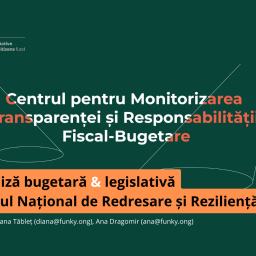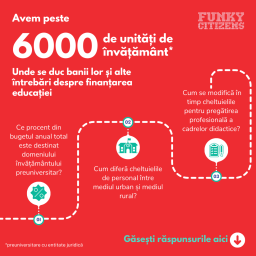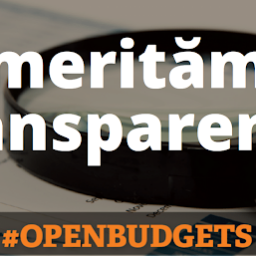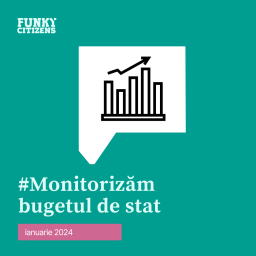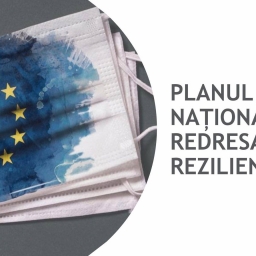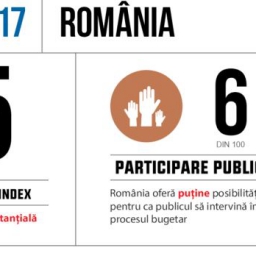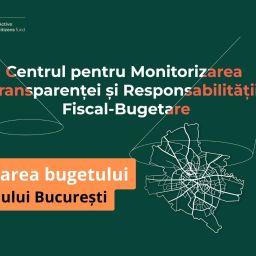
Today were published the results of the Open Budget Survey 2021 for Romania (#OpenBudgets). It is a study that appears every 2 years, conducted by the NGO International Budget Partnership. The results are accompanied by recommendations that Romania should follow for a more transparent state budget and close to our interest, the citizens.
Funky Citizens is a research partner for Romania, joining over a hundred other NGOs and academic institutions around the world that contribute to the study. This is an independent, comparative, objective-based research tool that assesses how authorities spend public money by measuring three internationally accepted macro indicators:
- Transparency - the extent to which the public has access to information related to the state budget
- Public participation - the extent to which there are formal opportunities for citizens to take part in the budget process
- Budget supervision - the input of Parliament (the legislator) and the Court of Auditors (auditor) throughout the process
You can access all the research materials (in English) on the International Budget Partnership website where you can also see the evolution over time of the scores that Romania had.
"Unfortunately, Romania has sacrificed the principle of transparency under the pretext of the pandemic and now of the war. We are also seeing declines in the oversight of the budget process, with hasty decisions leaving too much room for too much analysis, not even Parliament or other institutions involved in the process. These two elements need to be improved, especially now that we have made commitments such as joining the OECD, which also looks at these aspects of public budgets. " said Elena Calistru, president of Funky Citizens.
Transparency: 63/100
In 2021, Romania ranks 29th out of the 120 countries measured, between Ukraine and the Czech Republic, down from 2019, when it measured 64/100. The "Transparency" indicator measures public access to information about how the government collects and spends public money. A score of 61 or higher indicates the situation of a country that publishes enough material to support an informed public debate on the budget. Specifically, it evaluates, on a scale of 1 to 100, the online availability of the state budget, its timely publication and the comprehensiveness of 8 key budget documents, using 109 indicators of equal weight.
Recommendations
Romania can improve its budget transparency by publishing the online budget proposal on time, producing and publishing a budget in a simpler and less technical version for citizens and by including in the annual report on the budget execution of expenditure estimates, information on performance and indebtedness, as well as data on policies that are intended to directly help the most vulnerable segments of the population.
Public participation: 7/100
With a score of 7/100, it is the only indicator in which our country has improved its position compared to 2/100, in 2019. We are below Moldova and the Czech Republic which have 11 and 15. respectively The indicator "Public participation" examines the practices the executive, the legislature and the Court of Auditors compared to the formal opportunities for the public to participate significantly in different stages of the budget process. The evaluation is performed on a scale of 1 to 100 for each country, using 18 indicators of equal weight, following The Global Initiative for the Principles of Fiscal Transparency of Public Participation in Fiscal Policies.
Recommendations
In order to improve public participation in the budget process, the following measures are recommended to the authorities: The Ministry of Public Finance should pilot mechanisms for public involvement from the stage of the budget proposal and monitor budget implementation. It is recommended the active involvement of vulnerable or under-represented communities, through direct participation or through the civil society organizations that represent them; Parliament should ensure the participation and intervention of the public or civil society in hearings for the adoption of the draft budget, but also during the sittings of the Court of Auditors; and the Court of Auditors should develop effective and formal mechanisms for contributing to the public in the audit process, as well as ensuring transparent and timely updates on audit results.
Supervision: 43/100
The study also assesses the role that legislators and the Court of Auditors play in the budgetary process and the extent to which they ensure supervision. The "Supervision" indicator is composite, and the assessment is performed on a scale of 1 to 100, using 18 indicators of equal weight and the collection of additional information from independent tax institutions. The Romanian Parliament offers limited oversight in the planning phase of the budget cycle and weak oversight in the implementation phase. In 2021, Romania has a score of 43/100, registering a decrease compared to 2019, when the score indicates 50/100.
Recommendations
In order to improve oversight in the legislative institutions, Parliament should debate budgetary policy before receiving the budget proposal from the Government (the budget proposal should be forwarded to Parliament at least two months before the start of the budget year) and approve budget recommendations. future. Legislative committees should review budget implementation during the year, as well as the audit report, and then publish reports of its analyzes online. Finally, in order to ensure the independence of the auditor and to develop the supervision of the Court of Auditors, we need to ensure that the audit process is audited by an independent agency.
The Fiscal Council is Romania's independent fiscal institution. Its independence is provided by law and is reported to the legislature and the executive. The Council publishes its own fiscal and macroeconomic provisions, as well as its own cost estimates in the new policy proposals. The indicators on the Fiscal Council are not evaluated in the Open Budget Survey study.
Why open budgets
The government directly influences the well-being of citizens when deciding what taxes should be levied, what services to provide or how much they owe. Budget decisions have an impact especially among the most disadvantaged. Will citizens have the most vulnerable opportunities for a better life as a result of these budget decisions? The chances are that the answer will be "yes" if governments inform proactively and truly involve the public in making these vital decisions that affect their lives.
Moreover, the opening of budgets comes with a more inclusive democracy and more stable economies, attractive to investors. Countries that open their budgets have lower deficits, lower borrowing costs, more credible budgets, stronger democratic institutions, stronger revenue collection and better development outcomes.
About the Open Budget Survey
The study is part of the Open Budget Initiative, a global research and advocacy program of the NGO International Budget Partnership (https://www.internationalbudget.org). Launched in 2006 and conducted biannually, the study is the only independent, comparative and fact-based global research tool that measures the three aspects above that are essential for good governance. The study consists of a questionnaire of 228 questions answered by academic institutions or members of civil society in the countries concerned. The results are analyzed by independent experts using an objective and rigorous methodology



